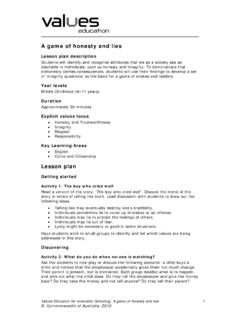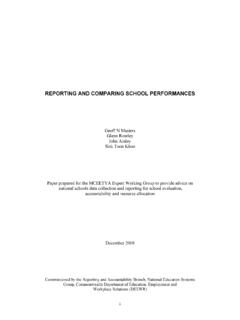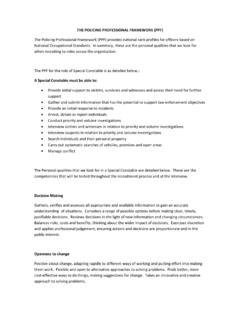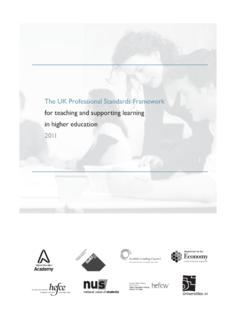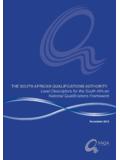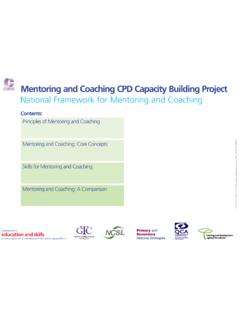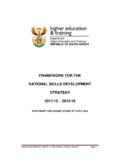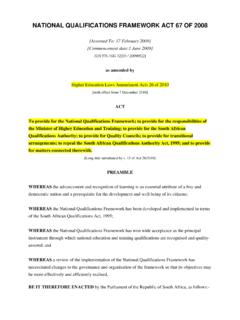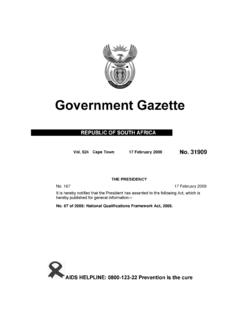Transcription of National Framework for Values Education booklet
1 National Framework for Values Education in Australian SchoolsNational Framework for Values Education in Australian Schools Commonwealth of Australia 2005 ISBN: 0 642 77496 XISBN: 0 642 77497 8 (online version)This work is copyright. Apart from any use as permitted under the Copyright Act 1968, no part may be reproduced by any process without prior written permission from the Commonwealth available from the Department of Communications, Information Technology and the Arts. Requests and inquiries concerning reproduction and rights should be addressed to Commonwealth Copyright Administration, GPO Box 2154, Canberra ACT 2601 or e-mail Introduction 12. Context 13. Vision 34. Values for Australian Schooling 45. Guiding Principles 56. Key Elements and Approaches that Inform Good Practice 67.
2 Glossary 811. IntroductionThe following National Framework for Values Education in Australian Schools has been developed from the outcomes of the Values Education Study (2003) and widespread consultation on a Draft Framework recognises the Values Education policies and programmes already in place in Education authorities and Australian schools. It also recognises that there is a significant history of Values Education in government and non-government schools, drawing on a range of philosophies, beliefs and traditions. It acknowledges that schools in all sectors are developing effective approaches to Values Education in the twenty-first Framework includes: a context; an underpinning vision for improved Values Education in Australian schools; a set of Values for Australian schooling, based on the National Goals for Schooling in the Twenty-First Century (1999); guiding principles to support schools in implementing Values Education .
3 And key elements and approaches providing practical guidance to schools in implementing Values ContextThe Ministerial Council on Education , Employment, Training and Youth Affairs (MCEETYA), at its meeting on 19 July 2002, unanimously supported the National Values Education Study commissioned by the Australian Government to inform the development of a Framework and set of principles for Values Education in Australian schools. MCEETYA also: acknowledged that Education is as much about building character as it is about equipping students with specific skills; noted that Values based Education can strengthen students self-esteem, optimism and commitment to personal fulfilment; and help students exercise ethical judgement and social responsibility; and recognised that parents expect schools to help students understand and develop personal and social key stakeholders in the Australian Education context have a strong commitment to Values Education .
4 This is reflected in the National Goals for Schooling in the Twenty-First Century, the Adelaide Declaration by all Education ministers in 1999. The National Goals recognise that:2 Australia s future depends upon each citizen having the necessary knowledge, understanding, skills and Values for a productive and rewarding life in an educated, just and open society. High quality schooling is central to achieving this vision.. Schooling provides a foundation for young Australians intellectual, physical, social, moral, spiritual and aesthetic development .The National Goals include the goals that students, when they leave school, should: have qualities of self-confidence, optimism, high self-esteem, and a commitment to personal excellence as a basis for their potential life roles as family, community and workforce members, (Goal ) and have the capacity to exercise judgement and responsibility in matters of morality, ethics and social justice, and the capacity to make sense of their world, to think about how things got to be the way they are, to make rational and informed decisions about their own lives, and to accept responsibility for their own actions (Goal ).
5 Within the community at large there is growing discussion about how our children acquire their Values and how they make sense of Values promoted by the media and their peers. Parents, caregivers and families are the primary source of Values Education for their children but they expect support from schools in this endeavour. Values Education is an essential part of effective 2003 Values Education Study revealed a broad range of varied and excellent practices and approaches to Values Education in Australian government and non-government schools. In particular, the Study provided a range of examples of good practice in three different domains of Values Education : articulating Values in the school s mission/ethos; developing student responsibility in local, National and global contexts and building student social skills and resilience.
6 And incorporating Values into all school policies and practices, including teaching programmes across the key learning Study clearly demonstrated the will and desire of all participating school communities to utilise Values -based Education to enrich students intellectual, physical, social, moral, spiritual and aesthetic development and to respond constructively and positively to a range of contemporary which took part in the study reported an increased willingness and capacity to address Values and Values Education in a much more explicit way or, at the very least, that their awareness of the need to do this had been raised. These schools also stressed that partnerships with parents and caregivers and their local community was fundamental to successful Values common Values emerged from the school communities in the Study and from the consultation that followed: care and compassion; doing your best; fair go; freedom; honesty and trustworthiness; integrity; respect; responsibility and understanding, tolerance and inclusion.
7 These Values also arise from the National 2004, following the Study, the Australian Government is providing funding of $ million over four years to help make Values Education a core part of Australian schooling through support for: school Values Education forums in every school in Australia; drug Education forums in every school; clusters of schools showcasing good practice approaches in line with the National Framework For Values Education in Australian Schools; curriculum and assessment resources for all schools to promote Values Education ; and National partnership projects with parents, teachers, principals and teacher of the challenges addressed in the Values Education Study included improving whole-school cultures, developing school mission statements incorporating a set of Values , including Values in key learning area programmes, increasing student engagement, belonging and connectedness to schooling, fostering student empowerment and encouraging youth civic participation, improving student and staff health and wellbeing, promoting improved relationships, tackling violence, anti-social and behaviour management issues, and building student resilience as an antidote to youth suicide and substance abuse.
8 The Study noted ways in which Values Education could support related initiatives such as the National Safe Schools Framework , the National School Drug Education Strategy and the MindMatters programme promoting mental health in VisionAll Australian schools provide Values Education in a planned and systematic way by: articulating, in consultation with their school community, the school s mission/ethos; developing student responsibility in local, National and global contexts and building student resilience and social skills; ensuring Values are incorporated into school policies and teaching programmes across the key learning areas; and reviewing the outcomes of their Values Education Values For Australian SchoolingNine Values for Australian Schooling have been identified for this National Framework .
9 They have emerged from Australian school communities and from the National Goals for Schooling in Australia in the Twenty-First Century. They are presented below in alphabetical order and not in any rank order of shared Values such as respect and fair go are part of Australia s common democratic way of life, which includes equality, freedom and the rule of law. They reflect our commitment to a multicultural and environmentally sustainable society where all are entitled to justice. Individual schools will develop their own approaches to Values Education in partnership with their local school communities, including students, parents, caregivers, families and teachers. These approaches should be consistent with the National Framework for Values Education in Australian Schools and with their State/Territory Values for Australian Schooling 1.
10 Care and Compassion Care for self and others2. Doing Your BestSeek to accomplish something worthy and admirable, try hard, pursue excellence3. Fair GoPursue and protect the common good where all people are treated fairly for a just society4. Freedom Enjoy all the rights and privileges of Australian citizenship free from unnecessary interference or control, and stand up for the rights of others5. Honesty and TrustworthinessBe honest, sincere and seek the truth6. IntegrityAct in accordance with principles of moral and ethical conduct, ensure consistency between words and deeds7. Respect Treat others with consideration and regard, respect another person s point of view8. Responsibility Be accountable for one s own actions, resolve differences in constructive, non-violent and peaceful ways, contribute to society and to civic life, take care of the environment9.





